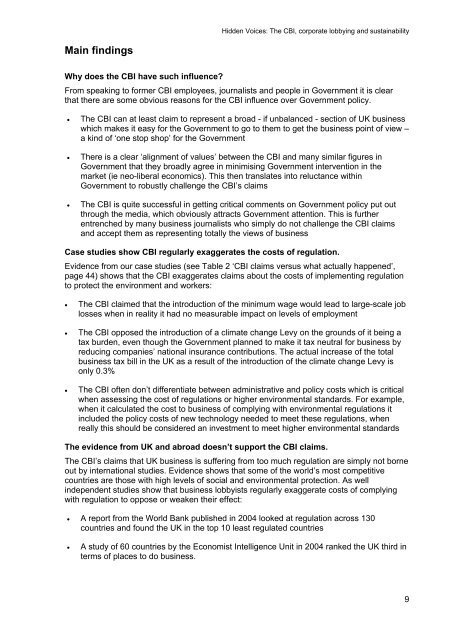hidden_voices
hidden_voices
hidden_voices
You also want an ePaper? Increase the reach of your titles
YUMPU automatically turns print PDFs into web optimized ePapers that Google loves.
Hidden Voices: The CBI, corporate lobbying and sustainabilityMain findingsWhy does the CBI have such influence?From speaking to former CBI employees, journalists and people in Government it is clearthat there are some obvious reasons for the CBI influence over Government policy.• The CBI can at least claim to represent a broad - if unbalanced - section of UK businesswhich makes it easy for the Government to go to them to get the business point of view –a kind of ‘one stop shop’ for the Government• There is a clear ‘alignment of values’ between the CBI and many similar figures inGovernment that they broadly agree in minimising Government intervention in themarket (ie neo-liberal economics). This then translates into reluctance withinGovernment to robustly challenge the CBI’s claims• The CBI is quite successful in getting critical comments on Government policy put outthrough the media, which obviously attracts Government attention. This is furtherentrenched by many business journalists who simply do not challenge the CBI claimsand accept them as representing totally the views of businessCase studies show CBI regularly exaggerates the costs of regulation.Evidence from our case studies (see Table 2 ‘CBI claims versus what actually happened’,page 44) shows that the CBI exaggerates claims about the costs of implementing regulationto protect the environment and workers:• The CBI claimed that the introduction of the minimum wage would lead to large-scale joblosses when in reality it had no measurable impact on levels of employment• The CBI opposed the introduction of a climate change Levy on the grounds of it being atax burden, even though the Government planned to make it tax neutral for business byreducing companies’ national insurance contributions. The actual increase of the totalbusiness tax bill in the UK as a result of the introduction of the climate change Levy isonly 0.3%• The CBI often don’t differentiate between administrative and policy costs which is criticalwhen assessing the cost of regulations or higher environmental standards. For example,when it calculated the cost to business of complying with environmental regulations itincluded the policy costs of new technology needed to meet these regulations, whenreally this should be considered an investment to meet higher environmental standardsThe evidence from UK and abroad doesn’t support the CBI claims.The CBI’s claims that UK business is suffering from too much regulation are simply not borneout by international studies. Evidence shows that some of the world’s most competitivecountries are those with high levels of social and environmental protection. As wellindependent studies show that business lobbyists regularly exaggerate costs of complyingwith regulation to oppose or weaken their effect:• A report from the World Bank published in 2004 looked at regulation across 130countries and found the UK in the top 10 least regulated countries• A study of 60 countries by the Economist Intelligence Unit in 2004 ranked the UK third interms of places to do business.9


